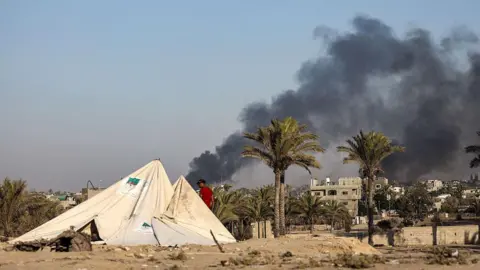The recent escalation in the ongoing Israeli-Palestinian conflict has attracted widespread international scrutiny, particularly following a series of attacks in Gaza that have raised alarms regarding humanitarian conditions in the region. The World Health Organization (WHO) has strongly condemned the Israeli military’s ground offensive in central Gaza, particularly the attacks on their facilities in Deir al-Balah, which occurred on 21 July 2025. This action by the Israeli forces is believed to have severely disrupted WHO’s operational efforts in the area, jeopardizing the delivery of healthcare and other essential services to vulnerable populations.
In its official statement, the WHO reported that its facilities, which housed staff and their families, were under direct attack from Israeli forces, leading to panic and distress among those seeking refuge. The organization highlighted that their primary warehouse was attacked, resulting in significant destruction and loss of medical supplies. Furthermore, the WHO claimed that their personnel, including women and children, were subjected to mistreatment during the assault, intensifying concerns over their safety in conflict zones.
The Israeli military has yet to provide an official response to the allegations presented by the WHO. However, this incident marks a significant escalation in military actions by Israel in the central region of Gaza, which has already seen tens of thousands of civilians displaced as a result of the ongoing conflict. The Israel Defense Forces (IDF) have stated that their operations in the region aim to dismantle what they describe as terrorist infrastructure utilized by Hamas, which governs Gaza. This operation follows a broader military campaign launched by Israel in response to a surprise attack by Hamas in October 2023, which led to considerable casualties.
Reports from the United Nations (UN) indicate a rising humanitarian crisis in Gaza, with alarming levels of malnutrition being reported amongst the populace. Health clinics and hospitals are witnessing an influx of patients suffering from severe health issues primarily attributed to malnutrition, compounded by the lack of accessible food and medical supplies due to ongoing conflicts. As humanitarian conditions deteriorate, aid agencies have warned of an impending hunger crisis that could exacerbate the existing challenges faced by the population.
On 21 July 2025, the Israeli military issued an urgent evacuation order affecting six city blocks in Deir al-Balah, urging residents to move towards the southern areas of al-Mawasi for safety. This directive put hundreds of families at risk, further straining the already fragile humanitarian situation. Notably, the WHO’s staff in the affected areas were also instructed to adhere to this evacuation despite the precariousness of such an action amid active military operations.
The WHO’s statements following the attacks condemned the violence in the strongest possible terms, emphasizing the challenges faced in safeguarding humanitarian personnel and operations amidst ongoing military engagements. It was highlighted that the safety of aid workers and populations should be a priority under international humanitarian law, reaffirming the necessity for their protection in conflict zones. The WHO reported that during the assault on their facilities, two of their staff and family members were briefly detained by Israeli forces, underscoring the perilous environment for health workers providing essential services in Gaza.
Furthermore, the WHO expressed that their operational capabilities are now severely compromised due to these attacks, dealing a blow to health system efforts amid an unfolding humanitarian disaster. The deteriorating environment intensified by the Israeli operations results in nearly 87.8% of Gaza now covered by military evacuation orders or classified as no-go zones, limiting movement for the 2.1 million inhabitants of the region and placing additional stress on essential services, which have reportedly collapsed entirely in many areas.
The impact of these military actions extends beyond immediate health care challenges; families of Israeli hostages believed to be held by Hamas have also voiced fears that the ground offensive may place their loved ones at further risk. With the conflict continuing, the potential for further escalations remains high, complicating an already dire situation for those caught in the crossfire of prolonged violence. As international bodies and organizations call for restraint and humanitarian access, the urgency for a peaceful resolution to this conflict has never been more critical.











